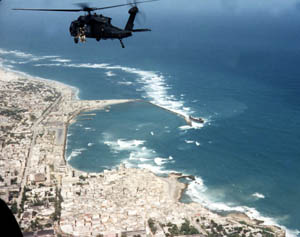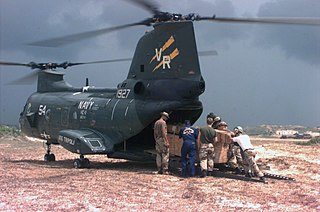 W
WThe Battle of Mogadishu, also known as the Black Hawk Down incident, and as Battle of Bakara Market in Malaysia, was part of Operation Gothic Serpent. It was fought on 3–4 October 1993, in Mogadishu, Somalia, between forces of the United States—supported by UNOSOM II—and Somali militiamen loyal to the Mohamed Farrah Aidid. It was part of the broader Somali Civil War, which had intensified since 1991 and threatened famine; the UN had become engaged to provide food aid, but eventually shifted their mission to establish democracy and restore a secure government.
 W
WBlack September, also known as the Jordanian Civil War was a conflict fought in the Hashemite Kingdom of Jordan between the Jordanian Armed Forces (JAF), under the leadership of King Hussein, and the Palestine Liberation Organisation (PLO), under the leadership of Yasser Arafat, primarily between 16 and 27 September 1970, with certain aspects of the conflict continuing until 17 July 1971.
 W
WThe Dhofar Rebellion, also known as the War in Dhofar or the Omani Civil War, was waged from 1962 to 1976 in the province of Dhofar against the Sultanate of Muscat and Oman. The war began with the formation of the Dhofar Liberation Front, a group which aimed to create an independent state in Dhofar, free from the rule of the Omani Sultan Said bin Taimur. The rebels also held the broader goals of Arab nationalism which included the ending British influence in the Persian Gulf region.
 W
WThe Eastern Command of the Pakistan Army was a corps-sized military formation headed by an appointed lieutenant-general, who was designated the Commander of the Eastern Command. After the partition of India by United Kingdom, the Islamic Republic of Pakistan was divided into two territories separated by 1,000 miles (1,600 km). Most of the assets of the Pakistan armed forces were stationed in West Pakistan; the role of the Pakistan armed forces in East Pakistan was to hold that part of the country until the Pakistani forces defeated India in the west. The Pakistan Army created the Eastern Command, with one commander in the rank of Lieutenant General responsible for the command. The armed forces, had drawn up a plan to defend Dhaka by concentrating all their forces along the Dhaka Bowl.
 W
WThe Islamic Emirate of Afghanistan was a totalitarian Islamic state established in September 1996 when the Taliban began their rule of Afghanistan after the fall of Kabul. At its peak, the Taliban established control over approximately 90% of the country, whereas remaining parts of the country in the northeast were held by the Northern Alliance, who maintained broad international recognition as a continuation of the Islamic State of Afghanistan. After the September 11 attacks and subsequent United States-backed war on terror, international opposition to the regime drastically increased, with diplomatic recognition from the United Arab Emirates, and Pakistan being rescinded. The Islamic Emirate ceased to exist on 17 December 2001, after being overthrown by the Northern Alliance, which had been bolstered by a US-led invasion of the country.
 W
WThe United Nations Organization Stabilization Mission in the Democratic Republic of the Congo or MONUSCO, an acronym based on its French name, is a United Nations peacekeeping force in the Democratic Republic of the Congo (DRC) which was established by the United Nations Security Council in resolutions 1279 (1999) and 1291 (2000) of the United Nations Security Council to monitor the peace process of the Second Congo War, though much of its focus subsequently turned to the Ituri conflict, the Kivu conflict and the Dongo conflict. The mission was known as the United Nations Mission in the Democratic Republic of Congo or MONUC, an acronym of its French name Mission de l'Organisation des Nations Unies en République démocratique du Congo, until 2010.
 W
WOperation Gothic Serpent was a military operation conducted by United States special operations forces during the Somali Civil War with the primary mission of capturing faction leader Mohamed Farrah Aidid. The operation occurred in Somalia from August to October 1993 and was supervised by the Joint Special Operations Command (JSOC).
 W
WThe Unified Task Force (UNITAF) was a United States-led, United Nations-sanctioned multinational force which operated in Somalia from 5 December 1992 until 4 May 1993. A United States initiative, UNITAF was charged with carrying out United Nations Security Council Resolution 794 to create a protected environment for conducting humanitarian operations in the southern half of the country.
 W
WThe United Nations Mission in Liberia (UNMIL) was a peacekeeping force established in September 2003 to monitor a ceasefire agreement in Liberia following the resignation of President Charles Taylor and the conclusion of the Second Liberian Civil War. The peacekeeping mission formally withdrew on 30 March 2018. At its peak it consisted of up to 15,000 United Nations military personnel and 1,115 police officers, along with a civilian component. It superseded the United Nations Observer Mission in Liberia (UNOMIL). As of July 2016, 1,240 U.N. military and 606 police personnel remained on the ground, but were there only in case of emergency.
 W
WThe United Nations Mission in South Sudan (UNMISS) is a United Nations peacekeeping mission for the recently independent South Sudan, which became independent on 9 July 2011. UNMISS was established on 8 July 2011 by United Nations Security Council Resolution 1996 (2011). UNMISS is since December 2016 headed by Special Representative of the Secretary-General David Shearer who succeeded Ellen Margrethe Løj. As of May 2019, it is composed of 15,000 military personnel, 1,800 police, and 2,800 civilian workers. It is headquartered in the South Sudanese capital of Juba.
 W
WThe United Nations Mission in the Sudan (UNMIS) was established by the UN Security Council under Resolution 1590 of 24 March 2005, in response to the signing of the Comprehensive Peace Agreement between the government of the Sudan and the Sudan People's Liberation Movement on January 9, 2005 in Sudan.
 W
WThe United Nations Operation in Burundi (ONUB) was established by United Nations Security Council in May 2004 to ensure the continuation of the Arusha Peace and Reconciliation Agreement signed on 28 August 2000.
 W
WThe United Nations Operation in Côte d'Ivoire (UNOCI) was a UN-NATO peacekeeping mission in Ivory Coast whose objective was "to facilitate the implementation by the Ivorian parties of the peace agreement signed by them in January 2003". The two main Ivorian parties here are the Ivorian Government forces who control the south of the country, and the New Forces, who control the north. The UNOCI mission aims to control a "zone of confidence" across the centre of the country separating the two parties. The Head of Mission and Special Representative of the Secretary-General is Aïchatou Mindaoudou Souleymane from Niger. She has succeeded Bert Koenders from the Netherlands in 2013 who himself succeeded Choi Young-jin from South Korea in 2011. The mission officially ended on 30 June 2017.
 W
WUnited Nations (UN) peacekeeping missions involving Pakistan cover about 70 operations throughout different parts of the world. Pakistan joined the United Nations on 30 September 1947, despite opposition from Afghanistan because of the Durand Line issue. The Pakistan Armed Forces are the third largest contributor of troops towards UN peacekeeping efforts, behind India and Ethiopia.
 W
WThe United Nations Protection Force, was the first United Nations peacekeeping force in Croatia and in Bosnia and Herzegovina during the Yugoslav Wars. The force was formed in February 1992 and its mandate ended in March 1995, with the peacekeeping mission restructuring into three other forces.